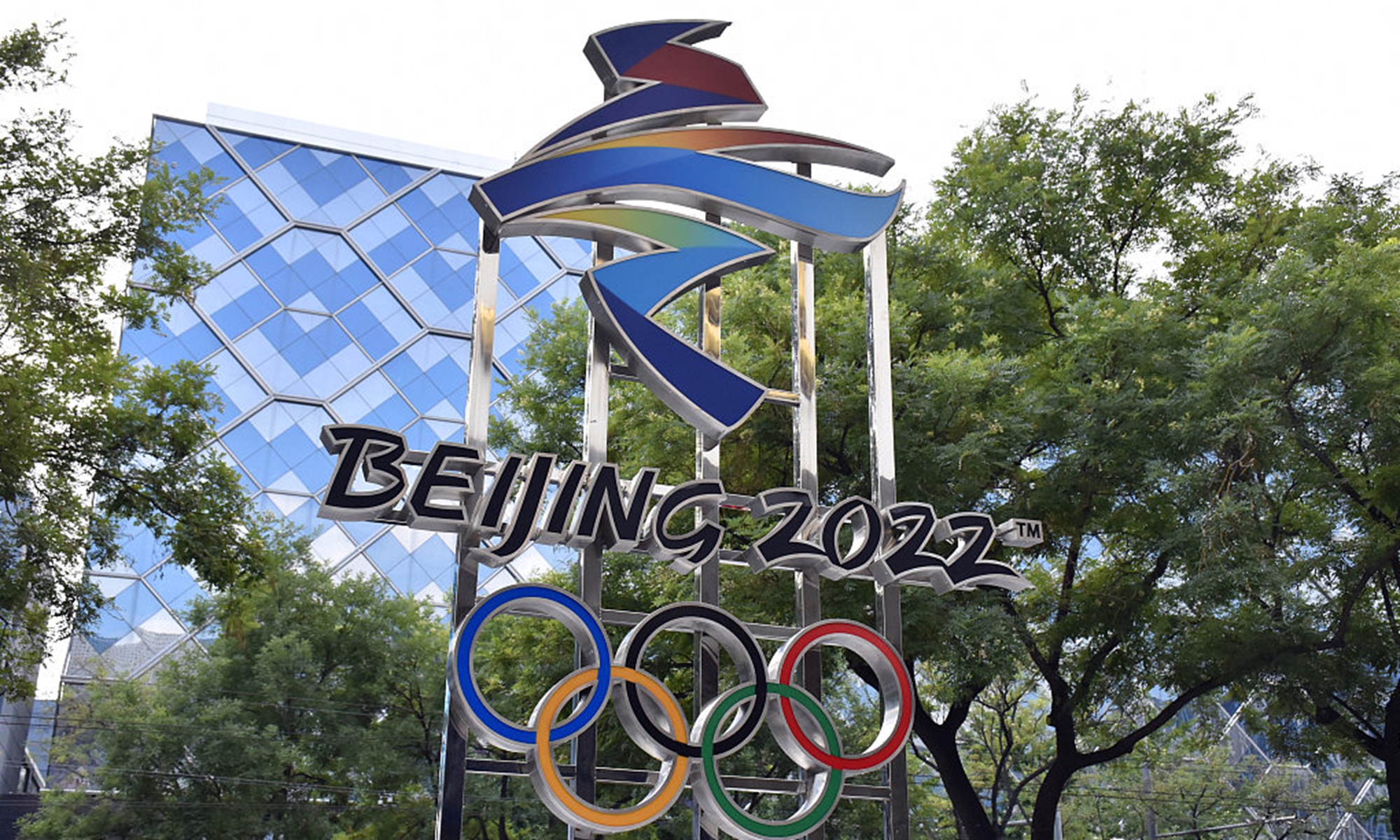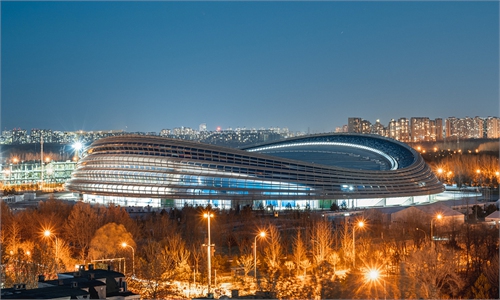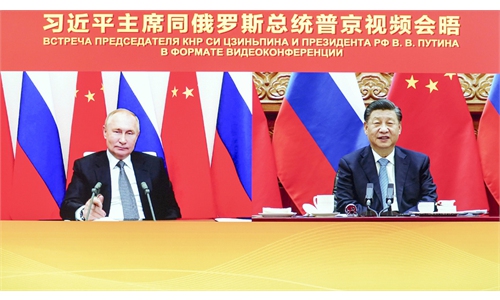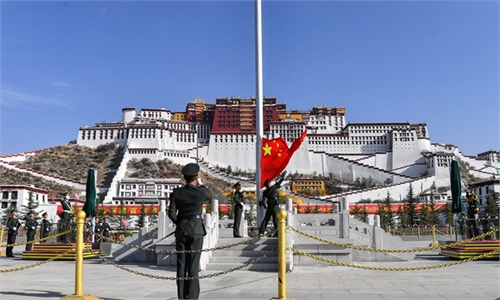Venue staff, reporters unveil details of Beijing 2022’s closed-loop system
Strict management ‘necessary’ in face of Omicron: experts

Winter Olympics Photo:VCG
Following the release of the second and final version of the Beijing 2022 Playbook, venues and support personnel are also making final preparations for epidemic prevention to better prepare for the approximately 30,000 overseas personnel who will arrive in Beijing for the Winter Olympic Games.
Thousands of athletes and support staff have already arrived in Beijing from overseas and experienced Beijing's closed-loop management during the test event phase. This policy has been praised by many athletes and the International Olympic Committee (IOC) officials as being the best and most reassuring epidemic prevention policy.
Building on this, Beijing has further improved its epidemic prevention manual and aims to reduce the likelihood of outbreaks within the closed-loop system and strictly prevent the spread of outbreaks outside the closed loop.
While some argue that the closed-loop management may be too strict, epidemiologists regard it as a necessary tool for holding large-scale international events as a new wave of COVID-19 outbreaks ravages the world. Beijing's measures can effectively fend off the risks even if Omicron gets stronger or spreads wider globally, said a member of the organizing committee on condition of anonymity.
Athletes and reporters
Thousands of foreign athletes and other personnel have already been in Beijing for some Winter Olympics test events, getting a preview of the closed-loop management measures that will be in place for the Beijing 2022 Games proper.
During the test phase, athletes and other personnel, including reporters, entered directly into the closed loop under the same conditions as requested during the Winter Olympic Games, a Winter Olympics vaccination manager told the Global Times on Wednesday on condition of anonymity.
The Global Times has learned that all Olympics-related personnel must stay in the closed loop during the Winter Olympics, even if they have been in Beijing for more than 21 days.
During the Winter Olympics, the Main Media Center (MMC) will be divided in two parts - inside and outside the closed loop. Reporters covering the Games will have access to the media center's resources for their stories even if they do not enter the closed loop, Zhang Lidong, chief engineer of China National Convention Center, to be used as the MMC for the Beijing Winter Olympics, told the Global Times.
This rule has also been confirmed by many reporters with oversea media outlets, based in China or overseas. Some noted that oversea reporters are allowed to enter the loop starting from January 4.
The Global Times has also learned that restrictions on athletes will not be overly strict. Medical exemptions from vaccines will be allowed, and athletes will not be disqualified if they are identified as close contacts.
Athletes who re-test positive after a positive test will be treated or transferred to a quarantine site. However, the event will not be canceled due to the presence of a positive case, and the venue will perform additional disinfection and sterilization of areas visited by the confirmed patients or their close contacts, and the competition will be postponed if necessary, Bao Weihua, epidemic prevention manager of the National Indoor Stadium, told the Global Times on Wednesday.
If an athlete is determined to be a close contact, this athlete can continue to compete if he or she tests negative and if certain regulatory conditions are met, according to the Beijing 2022 playbook.
All these rules have been in place for several months at the Olympic test events and have received thumbs-up from overseas participating athletes and IOC officials.
Speaking to the media after participating in the test event in Beijing, Latvian skater Denis Vasiliev said, "I have never seen a place where the epidemic prevention rules have been implemented so well, it's unbelievable. The organization here was fantastic. I feel completely ready here," as reported by thepaper.
"The venue is magnificent and beautiful, and the epidemic prevention measures make me feel especially safe," said Dutch speed skater Isabel Grevelt, who won multiple gold medals in the test events.
Thomas Bach, the IOC president, said that the feedback from athletes from various countries after participating in test events in Beijing was very positive and he was confident in the success of the Beijing Winter Olympics.
In-venue staff and spectators
During the test events, the closed-loop management worked well overall, with no concentrated infections, epidemic prevention staff for the venues told the Global Times.
However, they also found something that needed further improvement in the test events.
"The number of participants and the size of the event was only 17 percent of the real Winter Olympics, and the spectator organization was not put into test," Bao Weihua said.
Based on the problems that emerged during the test events, the venue improved its epidemic prevention measures, including adjusting the design of personnel flows, which is also reflected in the final version of the epidemic prevention manual, she said.
Beijing also saw its first test event with spectators on November 22, when 300 spectators arrived at the National Sliding Center, an outdoor venue hosting bobsleigh, luge and skeleton, to watch the event. They were asked to show a green health code, have their temperature measured on site and then enter the grandstand area through a separately designed flow line, with zero crossover with staff, athletes and others throughout.
Whether spectators will be admitted and the percentage of admission at the time of the Winter Olympics is currently undetermined, depending on how the Omicron variant and the overall epidemic situations develop in China and the world, Bao said.
"But based on the event's epidemic prevention requirements, it has been determined that there will not be many spectator seats available to the general public, excluding those provided for athletes and media."
Bao told the Global Times that Chinese staff at the venue will enter a smaller closed loop between January 4 and 6 to work with the foreign staff who will arrive then. This smaller closed loop is part of the larger Winter Olympics closed loop, which is expected to end on January 22. They will then join the athletes in the larger closed loop.
"All personnel working in the closed loop will have separate areas for working, eating and resting to ensure minimum interaction with delegates and athletes from overseas," a National Technical Official acting as an impartial judge of the alpine skiing competition at the Winter Olympic Games, surnamed Ma, told the Global Times on Wednesday.
"It will be mandatory to wear N95 masks throughout the working process and change them every four hours. We will take a nucleic acid test every day, and the result will come out in less than two hours," Ma said.
After receiving a booster shot, venue staff will enter closed-loop management at the National Alpine Ski Center in Beijing's Yanqing district in mid-January, about two weeks before start of the Games. They will stay in the closed-off area until April after completing a 21-day quarantine when both the Winter Olympics and Paralympic Winter Games are over.
Strict closed loop 'necessary'
As some Western media reports accuse Beijing's measures of being too strict, health experts defended them, calling it necessary.
Wang Guangfa, a respiratory expert at Peking University First Hospital, told the Global Times on Tuesday that half a year after the Tokyo Olympics, the Beijing Winter Olympics faces a different situation with the uncertainty from the new Omicron variant and possible fast spread of the disease in the winter season.
It's not known whether Omicron will result in more severe or mild cases, but many scientists believe it is a highly contagious variant like Delta, Wang said, noting that the risk from Delta persists, and Omicron and the winter season double the risks the Beijing Winter Olympics organizers are confronted with, indicating that a stricter COVID-19 policy is pretty much needed.
When the Tokyo Olympics came to an end in August, daily cases in several cities like Tokyo and Chiba prefecture hit a record high. Wang said some scientists believe this was related to the Olympics, as Tokyo did not impose strict rules for vaccination, and contacts with local people outside the bubble were not strictly prohibited.
Beijing has to learn a lesson from it, he said.
Ding Bocheng, a member of the organizing committee for the Beijing 2022, told the Global Times that Beijing's epidemic prevention and control focuses on early steps, such as detailed and mandatory requirements for participants before leaving for Beijing.
Along with the COVID-19 measures adopted in various venues, Beijing's measures can effectively fend off the risks even if Omicron gets stronger or spreads wider globally, Ding said.



